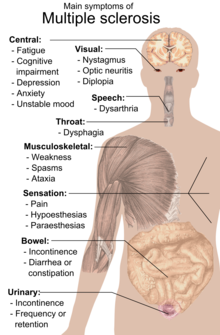 With the availability of better diagnostic facilities in India, there has been a steady rise in the detection of cases of Multiple Sclerosis (MS).
With the availability of better diagnostic facilities in India, there has been a steady rise in the detection of cases of Multiple Sclerosis (MS).
However, being diagnosed with MS and living with the challenges it presents, can be very tough. Depression is one of the most difficultto- handle consequences of MS. Several studies have suggested that clinical depression, the severest form of depression, is more often found in individuals with MS than the general population Multiple Sclerosis (MS) – a nerve disease whose cause and cure is yet unknown tends to take a toll on the patients, both physically and mentally. Identified by numbness, weakness, difficulty in movement, painful muscle spasms and excessive fatigue, Multiple Sclerosis brings about a major shift in the overall lifestyle of the patients.
According to Dr Jaydip Roy, HOD, Neurology, Y a s h o d a H o s p i t a l , Hyderabad, “The quality of life of patients significantly deteriorates with the development of Multiple Sclerosis.
For instance, the probability of an MS patient becoming handicapped is 30 percent more than the normal population.
Naturally, they have to deal with a lot of physical as well as emotional burden.
Therefore, the treatment of MS requires careful monitoring and individualized treatment plans.” Depression, largely found among the patients of MS is a life-threatening condition because it may generate suicidal feelings and can be attributed to an emotional response to having the disease or to the physiology of the disease. In fact, it has been found out that the risk of suicide is 7.5 times higher in the patients of MS.
Feeling sad, loss of interest in most activities, significant weight loss or gain, physical restlessness, fatigue and feeling personally worthless are some of the symptoms of MS that depict the onset of depression.
According to Dr R N Komal Kumar, Consultant Neurologist, Yashoda Hospital, Hyderabad, “It is difficult to say if depression is the cause or consequence of Multiple Sclerosis. MS patients are advised to lead a healthy lifestyle with adoption of practices such as yoga and meditation. Any sort of stress and infections should be avoided. Counseling sessions by the psychiatrists and discussions among the patients in groups are effective tools of dealing with depression.” Being an ailment that demands constant psychological support, therapies such as physical therapy, speech therapy and occupational therapy are used to reduce the severity of the attacks. The patients of MS can most effectively be healed through life sustaining activities.
However, the development in the form of Disease modifying therapies (DMTs) which include the interferons and the monoclonal antibodies can largely help in lessening the frequency the recurrent attacks and the prevention of disability.
S a y s Dr Kuma r , “Monoclonal antibodies, the new DMTs mark a considerable improvement over the medication already available.
They play their role by slowing down the progression of the symptoms. However, being a chronic, unpredictable disease that is clinically variable from patient to patient, the treatment of MS is given depending upon the severity of the attacks.”
ref:/ibnlive.in.com, http://en.wikipedia.org/